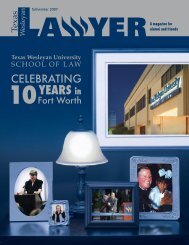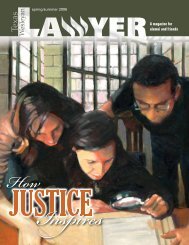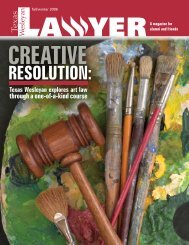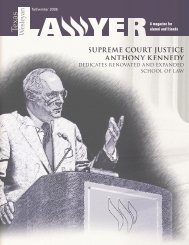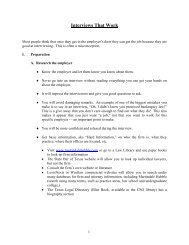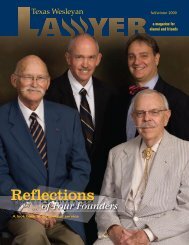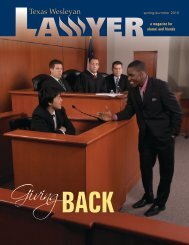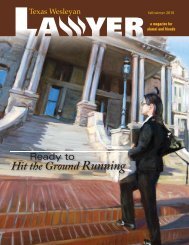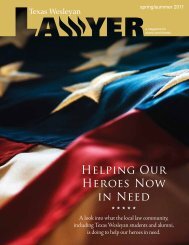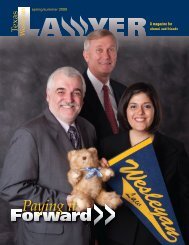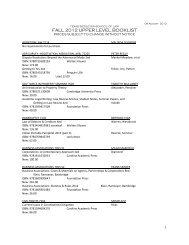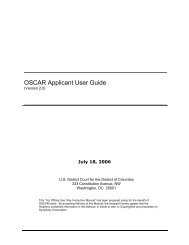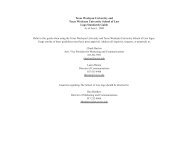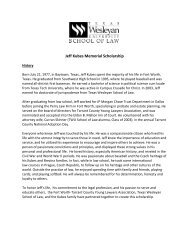Legal Analysis, Research, and Writing I - Texas Wesleyan School of ...
Legal Analysis, Research, and Writing I - Texas Wesleyan School of ...
Legal Analysis, Research, and Writing I - Texas Wesleyan School of ...
You also want an ePaper? Increase the reach of your titles
YUMPU automatically turns print PDFs into web optimized ePapers that Google loves.
<strong>Legal</strong> <strong>Analysis</strong>, <strong>Research</strong>, <strong>and</strong> <strong>Writing</strong> I (Fall 2010)<br />
Section 6 (Afternoon)<br />
Pr<strong>of</strong>essor Mark Burge<br />
Page 2<br />
Required Texts:<br />
1. Richard K. Neumann, Jr. & Sheila Simon, <strong>Legal</strong> <strong>Writing</strong> (Aspen 2008) (“<strong>Legal</strong><br />
<strong>Writing</strong>”)<br />
2. Michael D. Murray & Christy H. DeSanctis, <strong>Legal</strong> <strong>Research</strong> Methods (2d ed.<br />
Foundation 2009) (“<strong>Legal</strong> <strong>Research</strong>”)<br />
3. Tracy McGaugh, et al., Interactive Citation Workbook for The Bluebook: A Uniform<br />
System <strong>of</strong> Citation (LexisNexis 2010 ed.) (“ICW”)<br />
4. The Bluebook: A Uniform System <strong>of</strong> Citation (Columbia Law Review Ass’n et al. eds.,<br />
19th ed. 2010) (“Bluebook”)<br />
5. Deborah E. Bouchoux, Aspen H<strong>and</strong>book for <strong>Legal</strong> Writers (2d ed. Aspen 2009)<br />
(“Aspen H<strong>and</strong>book”)<br />
6. David S. Romantz & Kathleen Elliott Vinson, <strong>Legal</strong> <strong>Analysis</strong>: The Fundamental Skill<br />
(2d ed. Carolina Academic Press 2009) (“<strong>Legal</strong> <strong>Analysis</strong>”)<br />
Grades: This course follows the law school grading requirements set out in the “Academic<br />
St<strong>and</strong>ards” section <strong>of</strong> the 2009-10 edition <strong>of</strong> the Student Programs, Policies & Procedures<br />
manual for <strong>Texas</strong> <strong>Wesleyan</strong> University <strong>School</strong> <strong>of</strong> Law. The graded assignments for this<br />
semester are weighted as follows:<br />
Memo 1 (all components):.............................................................. 25%<br />
Memo 2:.................................................................................................. 50%<br />
Citation Exam (at the end <strong>of</strong> the semester):…....................... 10%<br />
<strong>Research</strong> Assignments:…………….................................................. 5%<br />
Class Preparation, Participation, <strong>and</strong> Homework…............. 10%<br />
Class Preparation <strong>and</strong> Participation: Note that ten percent <strong>of</strong> your final grade will be<br />
based upon your level <strong>of</strong> preparation for class <strong>and</strong> your participation in class. Among other<br />
things, this requirement means that I expect you to have completed the assigned readings<br />
<strong>and</strong> homework exercises, <strong>and</strong> also to participate in the in-class discussion <strong>and</strong> assigned<br />
activities.<br />
Class Attendance <strong>and</strong> Conduct: This course will follow the guidelines stated in the<br />
Student Programs, Policies & Procedures. These guidelines include the attendance<br />
requirements described in “Academic St<strong>and</strong>ards” <strong>and</strong> the guidelines for classroom conduct<br />
specified in the “Code <strong>of</strong> Conduct.” A student who violates Code <strong>of</strong> Conduct section 3.2.5 by<br />
disrupting the classroom or otherwise interfering with the right <strong>of</strong> others in the class to<br />
learn may be asked to leave the class. In this course, (i) any non-emergency use <strong>of</strong>—or<br />
audible sound from—a wireless communication device (including cellphones,<br />
smartphones, <strong>and</strong> pagers), <strong>and</strong> (ii) any use <strong>of</strong> a computer for non-class purposes (including<br />
for games, texting, email, <strong>and</strong> internet browsing) is considered disruptive classroom<br />
conduct. Any student asked to leave the class for disruptive conduct will be counted as<br />
absent for that class meeting. The absence will count toward the maximum allowed<br />
absences.



